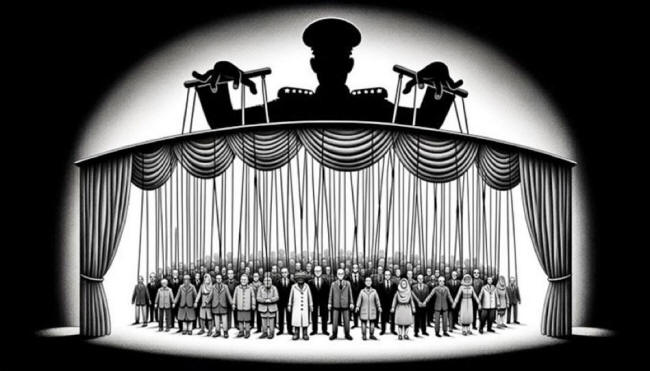|
by Josh Walkos and the Censorship Machine...
psychological operations and information warfare is complex and often controversial.
Our investigation explores the role of the United States government in this sphere, its partnerships with private enterprises and academia, and the emergence of a new Department of Defense (DOD) doctrine that views the entire world - both real and digital - as a battleground...
This concept is at the heart of a recent report by the US Government Accountability Office (GAO) entitled,
While the GAO and DOD do not explicitly refer to the "information environment" as a battlefield, it is difficult to read their documents without concluding that they perceive it as such.
By using
the term "information environment," the DOD effectively obfuscates
the true nature of its objectives - not only to its soldiers but also
to other branches of government and the general public.
On the pretext of "national
security," the DOD seeks to achieve full-spectrum dominance in the
information environment even if it means employing
counter-psychological warfare against its own citizens.
Throughout history, governments have attempted to influence both foreign and domestic populations via information operations.
The United States military has employed "strategic communication" since World War II, and during the Cold War, the United States Information Agency (USIA) disseminated pro-American propaganda worldwide.
The infamous CIA project, MK-Ultra,
The rise of the internet in the 1990s led to a significant expansion of the military's information operations, and in the wake of the 2001 September 11 attacks, these operations took center stage.
The
first deployment of weaponized social media can be traced to the
2010 Arab Spring, which saw the US military utilize platforms,
online messaging, and strategic communication to support
pro-democracy movements and suppress authoritarian regimes.
The creation of the 24-hour
Arabic-language radio station Radio Sawa provided extensive coverage
of the protests and amplified pro-democracy messages.
While such accounts are permitted under the guise of 'countering foreign disinformation campaigns,' the Pentagon itself determines when such a campaign is underway.
This grants them unbridled discretion to
engage in covert information warfare.
On December 31, 2012, President Obama signed the National Defense Authorization Act (NDAA), an annual legislation that sets the budget and expenditures for the DOD.
In 2023, $816.7 billion was
authorized for the DOD. Although some allocation of funds is
warranted for defense, the NDAA is often exploited as a tool for
policy and politics.
The original Smith-Mundt Act, originally enacted in 1948, authorized the State Department to develop methods to disseminate propaganda outside US borders.
Over time, however, it evolved into a program used to target American citizens.
The 2012 NDAA allowed for this, citing the threat of
foreign terrorist organizations, such as al-Qaeda, attempting to
persuade the American public to abandon Western ideals.
Despite assurances from lawmakers, recent history has revealed otherwise.
The
Russiagate affair, which accused
President
Trump of being a Russian asset, is a prime example.
The ASD created the now infamous "Hamilton 68 Dashboard," which purportedly tracked social media accounts linked to Russian influence campaigns.
Journalist Matt Taibbi exposed the dashboard's flawed methodology and lack of
transparency.
We are just now learning of the British Army's use of psyops on its
own citizens through its 77th Brigade.
It's not entirely inconceivable that these types of psyops were and are used against US citizens.
The Twitter Files exposed the FBI and
CIA for actively flagging accounts and badgering Twitter about it
while using veiled threats if they didn't accommodate their
censorship rampages.
Promising to end the war in Afghanistan and attempting to open up lines of communication with Vladimir Putin and North Korean dictator Kim Jong-un was a bridge too far for the neoliberal and neoconservative ruling class.
When
Trump won the presidency, the old boy network, intelligence
agencies, FBI, and bureaucrats jumped into action.
It involved arguably all aspects of the government, including,
It also relied on support from,
There are large swaths of people walking the earth right now who still unequivocally believe, with great conviction,
They continually cite completely false information as proof and laugh in your face if you question it or show them it's not true.
The power of
psychological warfare should not be dismissed. It is evident all
around us every day.
CNN alone has hired at least five:
Other networks have also gone down this path.
MSNBC
hired former CIA Director John Brennan, the architect of Russiagate,
for on-air analysis that amounts to blatant propaganda.
The Irregular Warfare
Technical Support Directorate (IWTSD) acts as a miniature Defense
Advanced Research Projects Agency (DARPA), specializing in powerful
psyop tools and intelligence entities.
Operating both on foreign and domestic soil, this secret army is more than ten times the size of the CIA's clandestine elements.
In 2021, Newsweek published an exposé titled "Inside the Military's Secret Undercover Army," publicly disclosing the existence of this force for the first time.
This lack of attention left what they termed a
"signature reduction" force operating unbeknownst to the world
without regulation or oversight.
Newsweek's two-year investigation, which included dozens of FOIA requests and interviews with program participants and decision-makers, revealed a sprawling network of at least 130 private companies assisting in these covert operations.
The annual
cost to taxpayers is estimated to be around $900 million.
silicon hand sleeve used operationally.
Photo
via W.M. Arkin/Newsweek
The investigation interviewed an operator who detailed how he helped
procure fake ID documents, driver's licenses, tax documents, and
more - all undercover and, in at least one instance in Washington
state, unbeknownst to even the governor.
According to Darby, they even make agreements with banks and credit card companies' security departments to look the other way in their identity fraud and money laundering investigations.
They can also create,
This hidden army operates in the shadows of a nation obsessed with security, bending perceptions and shaping reality with surgical precision.
The Pentagon, with its seemingly limitless power, wields these clandestine tools under the guise of 'countering foreign disinformation campaigns,' a decision left solely to their discretion.
This nebulous authority, granted by legislation such as
the National Defense Authorization Act (NDAA) and the Smith-Mundt
Modernization Act, has morphed from a well-intentioned endeavor into
a sprawling apparatus of manipulation.
From silicon face appliances that can alter one's appearance to infiltrating international databases, this invisible army defies detection at every turn.
For all its secrecy,
As the line between domestic and foreign operations blurs, questions of legality and morality go unanswered.
The implications of this clandestine warfare are far-reaching as the public sphere increasingly becomes a battleground for hearts and minds.
As evidenced by recent events, such as the Russiagate affair and the COVID-19 'pandemic', the tendrils of this invisible army have wrapped themselves around the fabric of society.
The media now finds
itself infiltrated by former intelligence and State Department
officials, blurring the line between journalism and propaganda.
Yet even in the face of such overwhelming odds, the resilience of the human spirit endures.
A
glimmer of hope remains as the light of truth struggles to pierce
the darkness of deception.
This army lived among European citizens, waiting to be "activated" for operations ranging from coups d'etat and torture to acts of terrorism.
The exposure of this secret army by Italian Prime
Minister Giuliano Andreotti in 1990 serves as a stark reminder of the
often hidden machinations of geopolitical players.
As the means of warfare evolve, the focus has shifted toward what is referred to as Fifth Generation Warfare (5GW):
In essence, 5GW aims to control the perception of reality itself.
As the world grows increasingly interconnected, the nature of warfare has undergone a seismic shift.
This new form of
warfare, defined by the manipulation of perception, information, and
cultural divides, poses a unique challenge to governments,
institutions, and citizens alike.
Its aim is not to destroy the enemy through brute force but to,
This subtle, insidious form of warfare requires a
comprehensive understanding of the tools and techniques employed by
those who wield it.
By controlling the flow of
information, these actors can influence the behavior of targeted
populations, turning public sentiment against adversaries or sowing
discord within rival nations.
This can include the promotion of certain ideologies, the manipulation of public opinion through media and entertainment, and even the funding of academic institutions or think tanks to advance a particular narrative.
In this way, governments can subtly guide the values,
beliefs, and aspirations of a population, steering them toward
desired outcomes without resorting to violence.
This concept relates to a book written in 1999 by two Chinese military officers entitled Unrestricted Warfare.
The authors state that,
Another term that refers to this type of warfare is "irregular warfare."
Regardless of the term, these practices involve the
sophisticated use of electronic warfare, propaganda, and
psychological manipulation designed to achieve a desired result.
In contrast,
Meanwhile,
The book also notes that,
Still,
though, the enemy is defined and aware there is a war going on.
Further,
The entire point of this type of warfare is to blur the lines between the military and civilians.
Objectives are achieved by manipulating perceptions and changing the context in which the world is perceived. It is a war where the frontlines revolve around morality and culture.
As the famous Prussian general and military theorist Carl von Clausewitz said (though translations vary) in his book On War,
By altering how the world is perceived, wars can be won without physical combat.
As Sun Tzu wrote,
This type of warfare makes sense from a strategic perspective.
Armed conflict as it has been traditionally employed simply cannot work in the 21st Century.
Rather,
To borrow again from The Handbook of Fifth Generation Warfare,
Since 5GW is a war of deception, it's almost entirely a war of influence.
Indian strategist Kautilya, who dates back to the 4th Century BCE came up with three spectrums of hostilities, as paraphrased in The Handbook of Fifth Generation Warfare:
"Any advanced 5GW is indistinguishable from magic." Arthur C. Clarke
Based on this description, it becomes quite apparent that beginning in 2020 with the emergence of COVID, the entire world was subjected to a highly advanced form of 5GW.
This idea is backed by the
revelation that multiple federal agencies were actively censoring
information, deploying a veritable army of censors to control the
narrative.
Another critical aspect of 5GW is cyber warfare...
Proxy warfare also plays a central role in 5GW, with governments supporting armed groups or insurgents to advance their strategic objectives while maintaining a veneer of plausible deniability.
By arming and training proxy forces, governments can extend their influence and further their goals without the need for direct military intervention.
This tactic allows them to circumvent
international law and avoid the political and economic costs
associated with overt acts of aggression.
The invisible nature of 5GW makes it difficult to detect and counter, and its focus on perception and influence means that it can be just as potent as traditional military force.
Moreover, the blurred lines between war
and peace that characterize 5GW pose a significant challenge to the
norms and laws that govern international relations, raising
difficult questions about accountability and state sovereignty.
The development of such technology by defense
agencies like
DARPA - the original pioneers of AI - raises questions
about the ethics and implications of using AI in psychological
warfare.
At a
time when public trust in institutions is already fragile, the
prospect of artificial intelligence being weaponized for
psychological warfare serves as an ominous reminder that we must
remain vigilant in our pursuit of truth and transparency.
As sentient beings, we possess the inalienable right to think, feel, and act of our own accord. The use of AI for psychological manipulation, however, threatens to undermine the very foundations of human agency.
The insidious nature of these operations, carefully crafted to evade detection, risks transforming the public into unwitting pawns in a grand game of perception and power.
In an age
when truth is a commodity, the exploitation of AI to manipulate
public consciousness undermines the sanctity of human autonomy and
the principles of informed consent.
As the tendrils of AI extend ever deeper into our digital lives, the potential for our most intimate thoughts and emotions to be mined, analyzed, and manipulated grows exponentially.
The capacity for AI-driven
psychological operations to exploit our deepest fears, desires, and
biases not only compromises individual privacy but also erodes the
collective trust that binds the fabric of society together.
By tailoring narratives to specific audiences, AI-driven psychological operations may deepen societal fissures, fostering polarization and discord.
In a world where misinformation already
runs rampant, the use of AI for psychological manipulation adds fuel
to the fire, destabilizing the very foundations of the truth on
which democratic societies are supposed to be built.
The risk of
losing our humanity, our capacity for empathy, love, and wonder in
the pursuit of AI-driven psychological manipulation calls into
question the very essence of what it means to be human.
Instead, we must recognize the power we possess as individuals, and as a society, to shape the future of AI in accordance with our deepest moral convictions.
By
fostering open dialogue, encouraging critical inquiry, and holding
our institutions accountable, we can ensure that the development and
deployment of AI are guided by the principles of transparency,
equality, and respect for human dignity - something we have a lot of
work to do in order to achieve.
As we stand on the precipice
of a revolutionary AI-driven world, we must remain vigilant,
striving to preserve the integrity of the human spirit.
|



